Eight years ago, Hillary Clinton lost the 2016 presidential election to Donald Trump, an especially bitter defeat for many community members of her alma mater. Heading into his second term, Trump now has more power to enact his sweeping agenda by virtue of a Republican-dominated government and a majority-conservative Supreme Court. Despite the ostensible sanctuary of a deep blue state like Massachusetts, Trump’s presidency will unequivocally impact the Wellesley College community.
Although Trump has denied any connection to Project 2025, at least 140 of his former staffers and allies drafted, wrote or edited the 900-page behemoth of a playbook, with JD Vance having written the foreword. It is clear to us that the President-elect’s coalition spent years preparing a blueprint to restrict freedoms and opportunities for women, people of color and LGBTQ+ communities. Project 2025 is already in motion. We must confront the stark reality that Wellesley College –– a historically women’s college and liberal arts institution — could face unprecedented challenges to core values like academic freedom and diversity, equity and inclusion.
Project 2025 advocates for eliminating the Department of Education and accuses the agency of doing “nothing to dampen the illiberal chill that has swept across American campuses over the past decade.” It also calls on the next President to issue executive orders curtailing DEI, critical race theory and gender programming. As a college that hosts one of the largest gender-focused social science research centers and produces extensive research on women and gender, Project 2025 is putting our institutional premise at risk — potentially impacting academic research on such subjects and resources at Wellesley.
Trump’s campaign policy is in lockstep with Project 2025 in its calls for the abolition of the Department of Education. This would require an act of Congress, and even if both chambers are majority Republican, it’s unclear whether this measure would pass. However, any significant funding cuts or major departmental restructuring poses a serious threat to educational quality and equitable access. Budget cuts would likely exacerbate financial barriers, especially for higher education, which is often a determinant of upward mobility. Without aid, the fees for attending Wellesley College are prohibitively expensive for the majority of our student body, approximately 60% of whom are receiving some form of financial aid. According to the National Center for Education Statistics’ most recent data for the 2021-22 academic year, 22% of Wellesley students were receiving Pell Grants and 18% were receiving federal student loans, for a combined 40% of our student body who rely on federal funds overseen by the Department of Education. If the department were dissolved, it’s possible these funds would be redirected and overseen by another, but would likely be accompanied by significant reductions, not to mention the capacity for other departments to distribute these funds efficiently. Higher educational access for all but the wealthiest students remains in jeopardy as long as this policy is on the table.
The second Trump presidency not only threatens domestic students, but international ones as well. Wellesley prides itself in creating “a community of global citizens,” with students hailing from more than 80 countries and speaking more than 30 languages. Our international students make up 13% of our student body, coming from China, India, South Korea, Hong Kong and beyond. Their future in America remains uncertain pertaining to their ability to obtain H-1B visas or other work visas. Under Trump’s previous presidential term, denial of H-1B visa petitions rose significantly.The potential for stricter immigration policies under a second Trump administration could significantly impact these students’ ability to remain in the U.S. after graduation.
Adding to concerns about Trump’s presidency is the tenuous future of reproductive rights. At a Wisconsin rally in the closing days of his campaign, Trump said, “Whether the women like it or not, I’m going to protect them.” His past record and future policies imply otherwise. He has openly boasted about restricting reproductive freedom –– “I was able to kill Roe v Wade” –– a direct consequence of appointing Trump-loyalists to the Supreme Court of the United States. His policies targeting women are also buttressed by a misogynistic past; Trump was found liable in court for sexual abuse on top of the dozens of women who have accused him of sexual misconduct. Despite saying he would veto a federal abortion ban if it lands on his desk, his campaign has proposed defunding Planned Parenthood and an attack on the Affordable Care Act’s birth control benefit. While medical abortions and access to contraceptives remain protected in Massachusetts, many students return home to states where this is not the case.
A second presidential term for Donald Trump will also include an intensification of his administration’s opposition to LGBTQ+ rights, particularly those of transgender individuals. Trump’s official policy agenda, listed on his campaign website as “Agenda 47,” includes promises to “Cut federal funding for any school pushing critical race theory, radical gender ideology, and other inappropriate racial, sexual, or political content on our children,” and “Keep men out of women’s sports.” These policies pointedly stoke the anti-woke and anti-trans faction of Trump’s base and promote the same fear-mongering narrative he campaigned on.
In the Spring of 2025, Wellesley College’s 150th graduating class will enter a world that may be drastically different from today’s. We should remember that when the Durants founded this institution, they envisioned a college that would prepare students for “…great conflicts, for vast reforms in social life.” This vision has remained steadfast as Wellesley graduates have consistently broken barriers, fought for equity, and driven progress across every field. The threats posed by Project 2025 and a second Trump administration, from restrictions on academic freedom to limitations on women’s and LGBTQ+ rights, directly challenge the principles that Wellesley stands for. Now, as we head toward another era of conflicts and reforms in an attempt to reverse our progress and gains, we must refuse to become complacent to the erosion of our freedoms, organize for and support those most harmed by this presidency and hold Wellesley College accountable for protecting members of the community.






